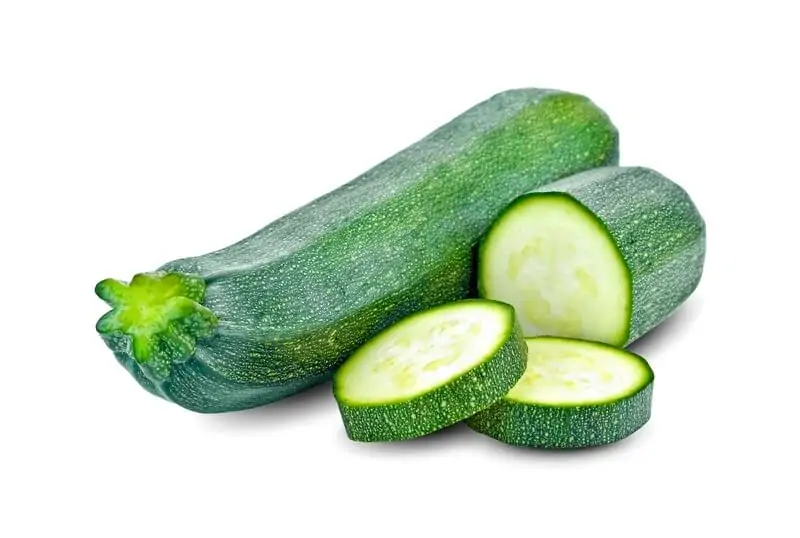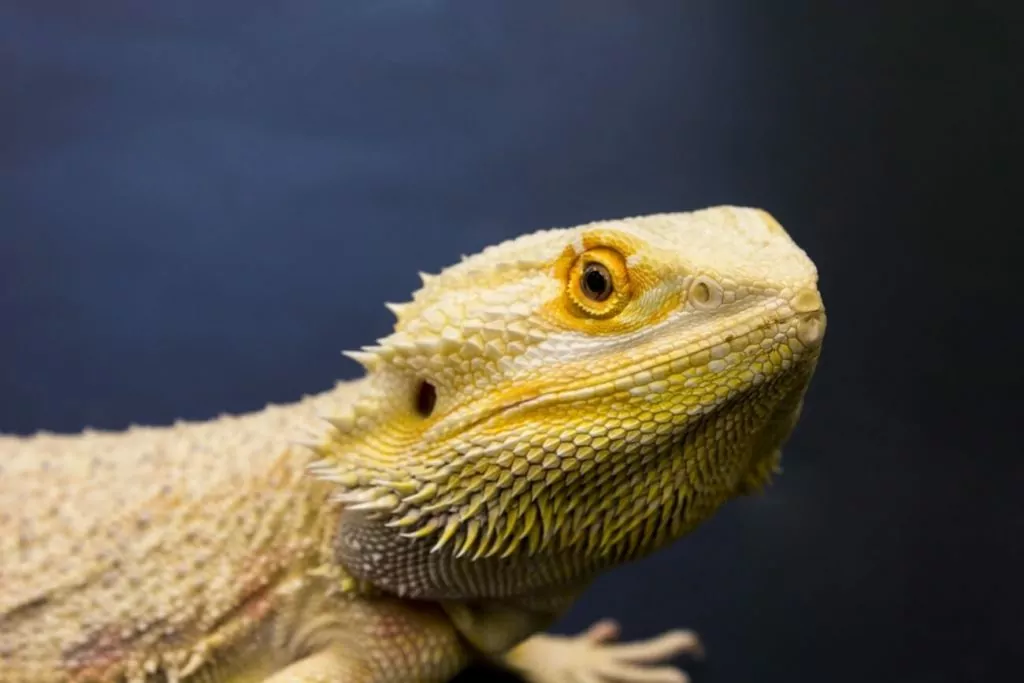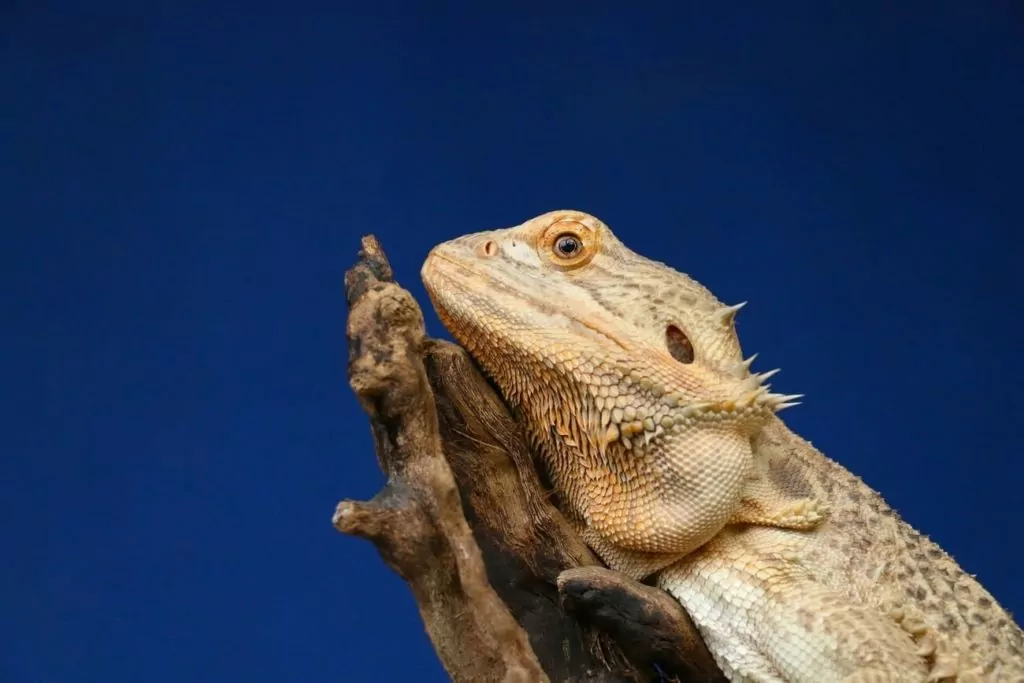There’s a lot of misinformation about zucchini that gets passed around by bearded dragon owners. Some say it’s harmless, and others say you should avoid it at all costs.
So can bearded dragons eat zucchini?
This guide will cover everything you need to know.
Table of Contents
Can Bearded Dragons Eat Zucchini?
Zucchinis are a somewhat misunderstood food. While most consider them vegetables that belong to the squash family, they’re technically seed-filled fruits!
Semantics aside, zucchini is generally seen as a healthy and tasty food choice for humans. For this reason, many bearded dragon owners consider tossing it into their lizard’s meal rotation.
Bearded dragons can eat zucchini in moderation. It’s perfectly safe for them to eat the it as an occasional snack.
However, it shouldn’t be a regular part of a bearded dragon diet. Not only can it pose potential long-term health risks, but there are far better food options to feed your pet bearded dragon.
Is It Healthy For Them?
There are both good and bad aspects to zucchini. For human consumption, this is a perfectly healthy meal. But it’s important to remember that while bearded dragons can eat zucchini, they have unique dietary needs. They also process and utilize nutrients and minerals differently.
The Good
Zucchinis can be a decent source of several vitamins and minerals. The green vegetable contains manganese, magnesium, and potassium. Those essentials boost your beardie’s metabolism levels, promote brain health, and regulate blood pressure, respectively. They also promote better muscular and nerve health.
When your bearded dragon eats zucchini, they’re also getting a decent amount of fiber and thiamine. The fiber content can improve gut health to avoid gastrointestinal upsets. Meanwhile, thiamine can enhance nervous tissue health.
Trace levels of Vitamins A, C, K, and B6 are present as well. Vitamin A and Vitamin C are crucial for overall growth, development, and reproductive health. Vitamin K regulates blood clotting and bone health, while B6 acts as a valuable source of energy.
On top of the vitamin and mineral content, zucchini has antioxidants like lutein and zeaxanthin. The antioxidants combat the effects of free radicals and cell oxidation.
Expert Tip: Another perk of consuming zucchini is that it’s low in calories and high in water. Dehydrated bearded dragons can eat it to get some much-needed moisture. Furthermore, the low-calorie snack won’t contribute to weight gain or increase your lizard’s risk of diabetes. That’s true even with older reptiles.
The Bad
On paper, zucchini seems like a decent dietary option for your bearded dragon. Unfortunately, the unsavory characteristics of this food tend to outweigh the good.
First off, zucchini isn’t very nutritionally dense. All those vitamins and minerals we discussed earlier? They only appear in trace amounts!
Bearded dragons need a lot more of those nutrients than what zucchini provides. If that’s your main reason to consider feeding zucchini, your lizard may fare better with other fruits and vegetables. Many healthier options are available.
Expert Tip: Ultimately, zucchini contains a lot of water and fall shorts everywhere else. While that may benefit dehydrated lizards, overeating zucchini could be detrimental. Regular consumption can lead to diarrhea, gastrointestinal upsets, impaction, and changes in their poop.
The lack of nutrients and high water content is bad enough. However, they don’t hold a candle to the unhealthy calcium and phosphorus levels.
You see, calcium is a must for bearded dragons. Like most reptiles, beardies are at risk for metabolic bone disease. They don’t have access to the UV light they need to synthesize and absorb calcium efficiently.
There are ways to overcome those issues through strategic enclosure setups. However, these lizards still need calcium-rich foods to make up the difference.
In a 100-gram serving of zucchini, there are only about 16 milligrams of calcium. That’s not nearly enough to combat the risk of metabolic bone disease.
It gets worse.
Zucchini has more phosphorus than calcium. The calcium to phosphorus ratio is 1:4.4, which is way out of the healthy range of 1:1 and 2:1.
Why does this matter? Well, phosphorus binds to calcium, which prevents your bearded dragon from absorbing it. If there’s more phosphorus than calcium, there’s nothing left for your lizard to utilize!
Vets typically recommend feeding foods that have a ratio of at least 2:1. That means if your bearded dragon eats zucchini regularly, their risks of skeletal issues go through the roof! Before long, they can start experiencing fractures, deformities, and a range of other unwanted injuries.
The occasional snack isn’t going to do much harm. However, zucchini snacks should be few and far between to ensure that it doesn’t impact their health.
How Often Should Bearded Dragons Eat Zucchini?
At most, you should only let your bearded dragon eat zucchini about once a month. If you’re feeding other foods with low calcium levels or high oxalates, you may want to consider feeding zucchini less often than that.
During those feedings, limit the snack to no more than a handful of pieces. An entire zucchini is far too much for a bearded dragon to eat at one time.
How To Prepare Zucchini For Them To Eat
As long as you treat zucchini as an occasional treat rather than a diet staple, your bearded dragon shouldn’t experience any ill effects.
However, that doesn’t mean you can offer up zucchini fresh off the vine. Like all fruits and vegetables, there’s some preparation involved to ensure that this food is safe and ready for your beardie to eat.
Here are some quick and easy preparation tips.
Choose Raw, Organic Zucchini
Organically grown zucchini is the best option for your bearded dragon. Store-bought varieties are fine, too.
However, you run the risk of inadvertently exposing your lizard to potentially harmful toxins. Organic vegetables are grown without chemical fertilizers or sprays. As a result, they don’t have any residue that could cause harm.
Whatever you do, don’t give your beardie canned or cooked zucchini. Cooking and preservation processes strip the nutrients from the vegetable. Zucchini is already pretty sparse in nutritional density, so you want to avoid cooked foods.
Expert Tip: Frozen zucchini will do if you’re in a pinch, but you must ensure that the vegetable sufficiently thaws. Frozen chunks could become a choking hazard.
Wash & Inspect
Next, wash the zucchini and examine it closely.
Toss out any vegetables that have physical deformities or abnormalities. This food is prone to insect infestations like any other vegetable. Insects can quickly spread parasites and disease-causing pathogens.
Steer clear of anything that looks suspicious.
Peel The Skin
Zucchini has a waxy peel that you need to remove. Use a potato peeler to strip it of that tough outer layer before you let your bearded dragon eat it. Keep peeling until you expose the light-green flesh inside.
Make sure to be thorough when peeling. Even a tiny piece of skin can get stuck in the throat and choke your bearded dragon.
Chop & Serve
Once the zucchini is washed and peeled, chop it into manageable pieces.
You can use a knife to make chewable chunks. Some herpetology enthusiasts like to use a shredder to make things easier. Either way, the goal is to make small pieces that your pet can easily swallow.
How you serve the zucchini is up to you. Many bearded dragons have no qualms about eating zucchini on its own. However, you can also add it to a green mix for some variety.
Final Thoughts
While bearded dragons can eat zucchini, at this point it should be clear that there are better options out there. While you can always provide this food as an occasional snack, it’s very important to restrict consumption for the sake of your reptile’s health.
If you have any questions about this food that we didn’t cover in the guide above, send them over. We’re more than happy to help set the record straight about this food!



